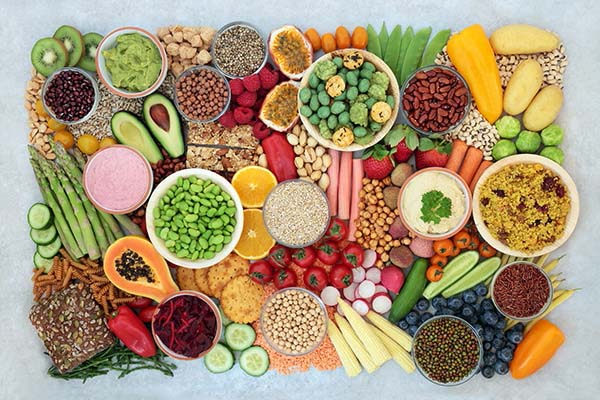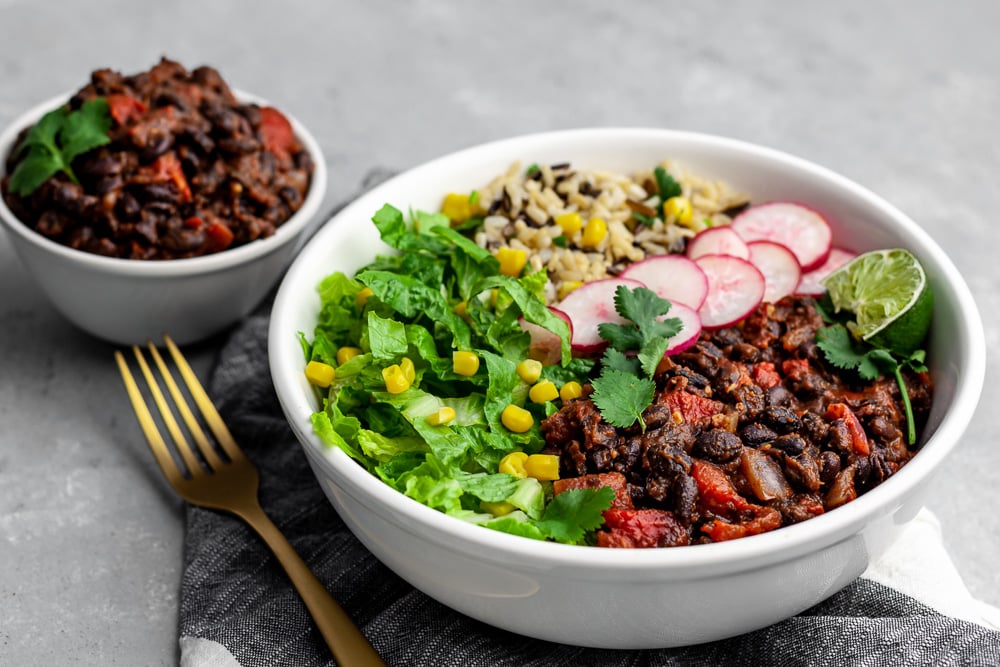Why Sugar Free Sauces Are a Game-Changer for Your Plant-Based Pantry
Why Sugar Free Sauces Are a Game-Changer for Your Plant-Based Pantry
Blog Article
All Regarding Healthy And Balanced Food: Benefits of Enjoying Plant Based Choices
The discussion bordering plant-based diet plans has actually obtained considerable focus in recent years. Several individuals are checking out the prospective wellness advantages, nutritional advantages, and environmental impacts related to these dietary choices. As people come to be extra knowledgeable about their food's impact on well-being and sustainability, questions arise about the practicalities of embracing such a lifestyle. What details changes can one anticipate, and how might these options improve not just personal health and wellness however likewise the earth's future?
Understanding Plant-Based Diet Regimens
Although many individuals connect plant-based diet plans primarily with vegetarianism or veganism, these diets can encompass a large range of eating patterns that prioritize whole, minimally refined plant foods. Such diet plans commonly include fruits, vegetables, entire grains, beans, nuts, and seeds, while getting rid of or limiting pet products. This adaptability enables individuals to customize their dietary selections according to dietary needs and personal preferences. Some might adopt a mostly plant-based diet while still sometimes consuming meat or milk, often described as a flexitarian method. The emphasis stays on integrating more plant foods, which can result in a varied array of meals and tastes. Understanding these different interpretations of plant-based eating is crucial for appreciating its ease of access and charm in modern food culture.
Health And Wellness Advantages of Plant-Based Foods
The wellness benefits of plant-based foods are considerable, using a nutrient thickness benefit that supports general well-being. Research study indicates that these foods can boost heart wellness and play an important duty in efficient weight monitoring. By including much more plant-based alternatives, people might improve their nutritional choices and promote lasting health.
Nutrient Density Advantage
Nutrient thickness plays a crucial duty in the health advantages of plant-based foods, making them a compelling choice for those looking for a balanced diet. Plant-based foods, such as fruits, vegetables, vegetables, nuts, and whole grains, are frequently rich in important vitamins, minerals, and antioxidants while being reduced in calories. This high nutrient thickness enables people to consume fewer calories while still satisfying their dietary requirements. Furthermore, these foods are loaded with dietary fiber, advertising digestive system health and wellness and assisting in weight monitoring. By including nutrient-dense plant-based alternatives, consumers can boost their overall health and wellness, support their immune systems, and lower the risk of persistent illness. Ultimately, the nutrient density of plant-based foods emphasizes their importance in a health-conscious lifestyle.
Heart Wellness Renovation

Weight Administration Assistance
In addition to promoting heart health and wellness, a plant-based diet can significantly assist in weight monitoring. This dietary strategy emphasizes entire foods such as fruits, vegetables, legumes, nuts, and whole grains, which are typically reduced in calories and greater in fiber contrasted to animal-based items. The high fiber web content helps enhance satiation, lowering overall calorie intake. Moreover, plant-based diet regimens are often rich in crucial nutrients while low in harmful fats, making it less complicated to maintain a healthy weight. Plant Based Chicken. Study shows that our website people who embrace a plant-based way of life tend to have lower body mass indexes (BMIs) and experience even more effective weight loss contrasted to those that eat meat-heavy diet regimens. Subsequently, embracing plant-based alternatives is a strategic choice for efficient weight administration
Nutritional Value of Plant-Based Active Ingredients
Plant-based components are abundant in crucial nutrients, supplying a diverse array of vitamins, minerals, and antioxidants that add to total health. A contrast of healthy protein sources exposes that while pet items are frequently viewed as remarkable, several plant-based choices offer ample healthy protein and other beneficial compounds. Recognizing the nutritional worth of these ingredients can help people make notified nutritional selections.
Necessary Nutrients in Plants
Nutrient-rich ingredients located in plants offer a varied array of essential vitamins and minerals that add considerably to total health. These active ingredients are rich in vitamins A, C, and K, which sustain immune feature, vision, and blood clotting, specifically. In enhancement, plants offer vital minerals such as calcium, potassium, and magnesium, essential for heart health and wellness, muscle function, and bone strength. The presence of fiber in plant-based foods help digestion and advertises a healthy and balanced gut microbiome. Anti-oxidants, found perfectly in fruits and vegetables, aid fight oxidative stress and anxiety and lower inflammation. Lots of plant foods are reduced in calories yet high in nutrients, making them an outstanding option for those seeking to preserve a healthy weight while guaranteeing perfect nutrient consumption.

Comparing Protein Resources
Healthy protein resources vary significantly in their dietary profiles, with plant-based ingredients supplying distinct advantages. Unlike pet proteins, which usually consist of hydrogenated fats and cholesterol, plant healthy proteins often tend to be lower in these harmful components. Legumes, nuts, seeds, and entire grains are rich in vital amino acids, fiber, vitamins, and minerals. Lentils offer high healthy protein content alongside substantial iron and folate, while quinoa is a full healthy protein, offering all 9 vital amino acids. In addition, plant-based healthy proteins are usually gone along with by antioxidants and phytochemicals that sustain overall wellness. The change to plant-based healthy protein sources not only improves dietary intake yet additionally straightens with lasting dietary techniques, lowering ecological influence and promoting long-lasting wellness advantages.
Environmental Effect of Plant-Based Consuming
As understanding of climate modification grows, lots of people are checking out sustainable dietary choices that can substantially minimize their ecological footprint. Plant-based consuming has become a substantial factor to lowering greenhouse gas discharges, which are mostly linked with livestock production. The farming of fruits, grains, vegetables, and legumes normally requires less sources, such as water and land, contrasted to animal farming. Furthermore, plant-based diet plans can lead to reduced logging, as much less land is needed for grazing animals or growing animal feed. By moving in the direction of plant-based choices, consumers can support biodiversity and advertise healthier environments. On the whole, accepting plant-based consuming not just advantages personal click health however also represents a vital action towards environmental sustainability and preservation initiatives.
Conquering Common Misconceptions
While many individuals recognize the advantages of a plant-based diet plan, numerous misunderstandings usually hinder them from fully accepting this lifestyle. A common idea is that plant-based diet plans do not have adequate protein; however, countless plant resources, such as beans, nuts, and tofu, offer enough healthy protein. Additionally, some assume that this diet is pricey, when actually, staples like beans, rice, and seasonal vegetables can be fairly inexpensive. One more misconception is that plant-based eating is overly restrictive, whereas it in fact supplies a diverse range of flavors and foods. Several fret that a plant-based diet may lead to shortages, yet with appropriate preparation, individuals can obtain all required nutrients, including minerals and vitamins, while enjoying a vast selection of tasty meals.
Tips for Transitioning to a Plant-Based Way of living
Making the shift to a plant-based way of living can be an enhancing experience, though it usually requires some guidance to browse the initial changes. First, people are motivated to begin gradually, incorporating even more fruits, vegetables, vegetables, and whole grains into their meals while minimizing meat and dairy usage. Dish preparation is crucial; preparing a weekly food selection can aid relieve the modification and stop final harmful choices. Exploring cooking techniques and new dishes can also enhance the experience and keep enjoyment concerning plant-based consuming. Furthermore, joining support system or areas can give inspiration and share useful tips. Staying notified concerning nutrition guarantees balanced dishes, preventing deficiencies while fostering a healthy, gratifying plant-based way of life.

Delicious Plant-Based Dish Ideas
Discovering delicious plant-based dish ideas can motivate individuals to welcome a much more nutritious diet plan. One preferred choice is a hearty quinoa salad, featuring cherry tomatoes, cucumber, and a spicy lemon-tahini clothing. An additional favorite is a mouthwatering lentil stew, loaded with carrots, celery, and aromatic natural herbs, best for a calming dinner. For morning meal, overnight oats made with almond milk, chia seeds, and topped with fresh berries provide a nutritious beginning to the day. Furthermore, a lively veggie stir-fry with tofu and a selection of vivid veggies can be a fast yet satisfying dish. Creamy avocado toast on whole-grain bread, sprinkled with seeds and flavors, supplies a straightforward yet flavorful snack. These meals showcase the selection and richness of plant-based eating.

Regularly Asked Concerns
Can a Plant-Based Diet Regimen Give Sufficient Healthy Protein?
The inquiry of whether a plant-based diet plan can give adequate protein prevails. Many sources, including vegetables, nuts, seeds, and whole grains, can fulfill healthy protein requires properly, sustaining a balanced and nourishing diet plan for people.
Are Plant-Based Diets Suitable for Kid?
The viability of plant-based diet plans for youngsters depends on careful preparation. Ample nutrients should be assured, consisting of minerals, healthy proteins, and vitamins. With correct assistance, such diets can support healthy development and advancement in youngsters.
Just how Do I Eat in restaurants on a Plant-Based Diet plan?
Dining out on a plant-based diet plan includes looking for restaurants with diverse food selections, asking for alterations, and discovering vegan-friendly alternatives. Planning in advance and interacting nutritional choices can enhance the eating experience while maintaining nutritional options.
What Prevail Allergens in Plant-Based Foods?
Typical irritants in plant-based foods consist of soy, gluten, nuts, and seeds - Plant Based Chicken. People complying with a plant-based diet plan ought to be conscious of these irritants and read tags carefully to prevent damaging reactions and ensure secure consumption
Can Plant-Based Diets Assist With Weight Reduction?
Research study suggests that embracing a plant-based diet regimen may facilitate weight loss due to its commonly reduced calorie thickness and greater fiber content. This mix can enhance satiation, assisting people manage their calorie consumption efficiently. Many people connect plant-based diet plans generally with vegetarianism or veganism, these diets can include a wide range of eating patterns that prioritize whole, minimally refined plant foods. Nutrient thickness plays a sites necessary role in the wellness advantages of plant-based foods, making them a compelling option for those looking for a well balanced diet plan. Plant-based diet regimens have actually been revealed to noticeably boost heart wellness, as they often include components that sustain cardio function. In addition to advertising heart wellness, a plant-based diet regimen can significantly aid in weight monitoring. A common belief is that plant-based diet regimens lack sufficient protein; nevertheless, countless plant resources, such as beans, nuts, and tofu, supply ample protein.
Report this page